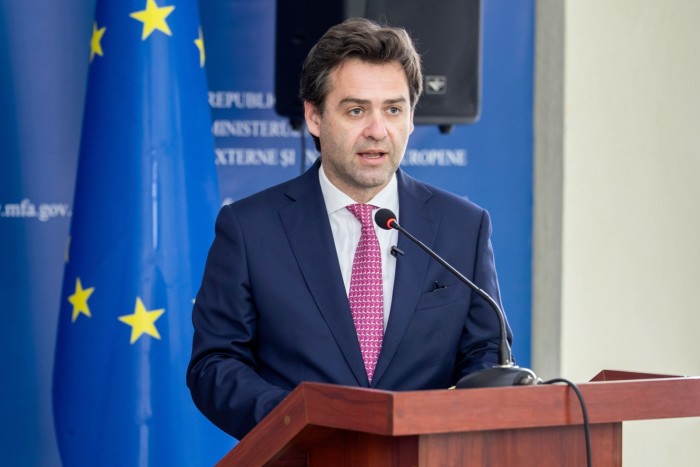European leaders gather for security summit on Ukraine’s doorstep

Roula Khalaf, Editor of the FT, selects her favourite stories in this weekly newsletter.
Almost 50 leaders from across wider Europe are to arrive in Moldova for a summit focused on the continent’s multiple security issues, ranging from the war in Ukraine to an ongoing conflict between Armenia and Azerbaijan, and rising tensions in the Balkans.
The second European Political Community summit will take place on Thursday just 8km from a Russian-controlled separatist enclave and 21km from the Ukrainian border — marking the acute insecurity on Europe’s periphery and the challenges posed to EU and Nato powers over how to tackle it.
“It’s a complicated time, but that’s exactly why the EPC is needed and necessary, for Europe to come together and share the weight of solving these problems,” said Nicu Popescu, Moldova’s deputy premier and foreign minister.
Founded last October as the brainchild of French president Emmanuel Macron with an inaugural summit in Prague, the EPC is pitched as a unique forum for all of Europe’s leaders — minus Russia and Belarus — to discuss security issues and address regional disputes in a less formal setting than the EU or Nato.
The 47 leaders from EU countries, the UK, Ukraine, Norway and other nations will gather in eastern Moldova under the protection of temporary air defences manned by British, French and Romanian troops.

The leaders will be broken up into smaller groups for thematic roundtables, focusing on the issues of security, energy and connectivity. The summit will include a cocktail reception and leaders will have plenty of time for bilateral meetings, according to a person involved in the scheduling.
“It provides a platform of unity, strength and togetherness for the European continent and gives everyone a chance to weigh in on joint efforts to bring peace back to our continent . . . especially in a part of Europe directly affected by the largest military aggression on the continent since the second world war,” Popescu said.
The summit comes amid a surge in tensions in northern Kosovo that has seen more than a dozen Nato peacekeeping troops injured in clashes with Serbian protesters, raising the spectre of conflict in the Balkans. The leaders of both Kosovo and Serbia have been invited to the summit.
The summit’s organisers are also hopeful that Ukraine’s president Volodymyr Zelenskyy will attend.
A meeting on the sidelines of the summit between the leaders of Armenia and Azerbaijan, chaired by European Council president Charles Michel and joined by the leaders of France and Germany, is aimed at pacifying the two former Soviet republics still clashing over a disputed region. Russia has also made attempts at striking a peace deal, to no avail.
“European security is not guaranteed, the economy is fracturing and there are very vulnerable states all around,” said one senior European diplomat attending the summit. “This gives all of us a sense of togetherness.”
Participants say it provides a welcome platform for both informal and frank group discussions and bilateral meetings that would otherwise require cumbersome national visits.
“It’s Davos for prime ministers and presidents, and they seem to like it,” said Hans Kribbe, director of the Brussels Institute for Geopolitics, a think-tank. “There is no other forum in Europe that offers the same freedom.”
Gathering at the more than 120-year-old Mimi Castle in eastern Moldova, the leaders will also confront their host country’s precarious geopolitical situation.
The château is 8km from Transnistria, an enclave captured by Russian-backed separatists in 1992 that Chișinău has since feared could be used by Moscow to destabilise the rest of the country. Beyond that lies Ukraine and a conflict that has spilled over into Moldova in the form of economic crisis, refugees and missiles landing on its territory.
Moldova’s need for increased western support is likely to be a key part of the summit’s choreography, with Chișinău hopeful of commitments of financial, political or security support from visiting leaders, officials said. Among those are a mobile-phone roaming agreement with the EU.
On Tuesday Brussels agreed sanctions against Moldovan oligarchs in exile who have funded or enabled pro-Russian destabilisation actions against the country’s government.
The country’s economic struggles and limited infrastructure has already meant leaders have been asked to share private jets so as to not exceed the capacity of its main airport, and Nato forces have been brought in to run air defence exercises over the time of the summit.
“For Moldova the summit is a lifetime opportunity to project and secure its European identity. The message to Moscow is: we are not alone. Our home is in Europe,” said Kribbe. “The [summit’s] most important deliverable, if you want to use the word, is the family picture.”
Comments